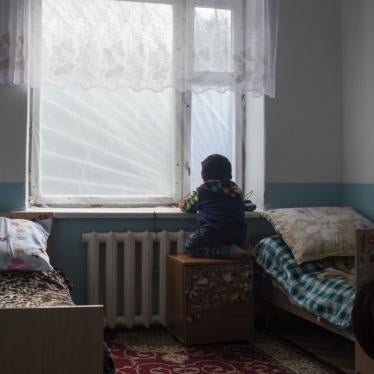Seven year-old Nika brims over with life, dancing and singing her way around the kitchen of her family’s home outside Moscow. All smiles, she pauses to tell a visitor about the ballerinas she saw perform at a recent Christmas show, recites bits of poetry and then scampers off to the living room – littered with toys and children’s books – to play with her younger sister.
It’s hard to believe that hours after Nika’s birth, doctors told her mother, Lyudmila, or Mila, Kirillova, that as a baby with Down's syndrome, Nika would never develop – that in the best-case scenario, she would say “Mama” by age 36. That day, doctors began pressuring Mila and her husband to institutionalize Nika, to leave their baby in a special hospital ward for abandoned children, Mila told Human Rights Watch researcher Andrea Mazzarino.
Nearly 30 percent of children with disabilities in Russia live in state orphanages, where they may face violence and neglect, and where they often lack adequate nutrition and health care. These children – most of whom have one living parent – can be confined to their cribs for days or even weeks, according to a new Human Rights Watch report. Often the only attention they receive is having their feeding tubes adjusted and diapers changed. Many are heavily sedated by an overwhelmed staff which lacks training in non-violent childrearing methods and which views sedation as the only way to discipline children or prevent them from behaviors like banging their heads against the cribs.
Stunted by this environment, some children who are school age or even teenagers, appear to be no bigger or older than toddlers. Human Rights Watch interviewed children who said that orphanage staff beat them and sent them to psychiatric hospitals for days or weeks at a time to control or punish them.
While the Russian government has committed itself to moving away from institutionalization, officials have not focused enough attention on the special circumstances of children with disabilities. So healthcare workers are still pressuring parents to give these children up, claiming they won’t develop and that their parents wouldn’t be able to care for them.
Doctors painted a bleak picture of Nika’s future in the days after her birth. She would never be able to walk or talk. She wouldn’t be able to go to school. Mila was told she and her husband would never be able to care for Nika. Give her up, move on, the doctors said. Two days after Nika’s birth, Mila and her husband signed the papers giving up custody of their child. Mila left the hospital feeling embarrassed and humiliated, she said.
Although many parents who give up their children are discouraged from visiting, Mila visited Nika regularly. As the months passed, doctors told Mila that Nika wasn’t developing the way a baby should. Mila began to worry that Nika wasn’t getting enough attention.
Mila thought constantly about her daughter and decided she wanted her back.
She told the hospital officials of her decision. They repeatedly tried to talk her out of it. One official said Nika needed to stay institutionalized for observation and medical procedures. The hospital suggested Mila needed to consult a psychologist.
Ultimately, Mila prevailed. Nika had spent more than a year of her life in a hospital, but once home she grew in ways that far surpassed her parents’ expectation, learning how to walk and talk and engage with the people around her.
It wasn’t always easy. Because it’s so common to institutionalize children with disabilities, Mila had a hard time finding community-based services to support their family. Nika couldn’t be enrolled in a mainstream school, but Mila found a school for children with vision problems that Nika attends, where she has access to speech therapists as well as other specialists, including tutors. She eventually found a network of other parents through a nongovernmental organization called Downside Up, for kids with Down’s syndrome.
Today, Mila talks about Nika with pride, calling her a happy, friendly kid. She’s pleased that Nika appreciates beauty, be it music, dance or poetry. Her daughter is having trouble counting, Mila says, but they’re working on it. In the future, she’d like to see Nika in a mainstream school, or maybe even go to college. She hopes she can be self-sufficient and be able to take care of herself. She also looks forward to Nika one day falling in love and maybe having a family of her own.

